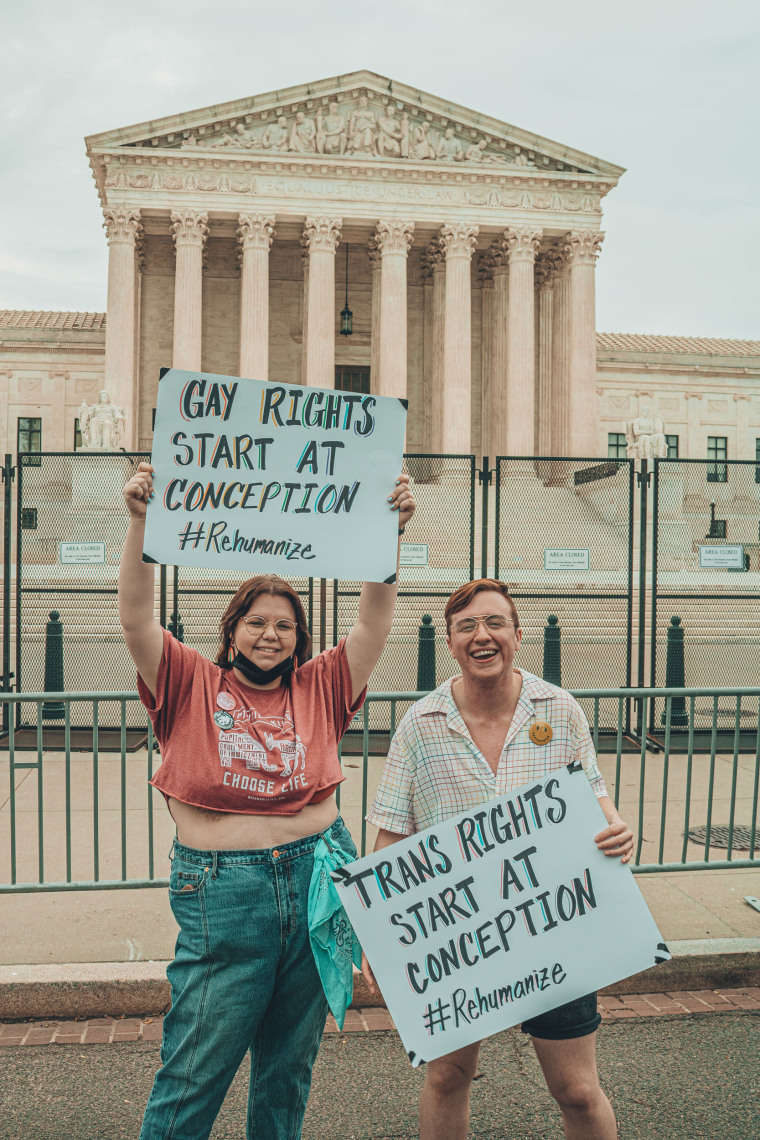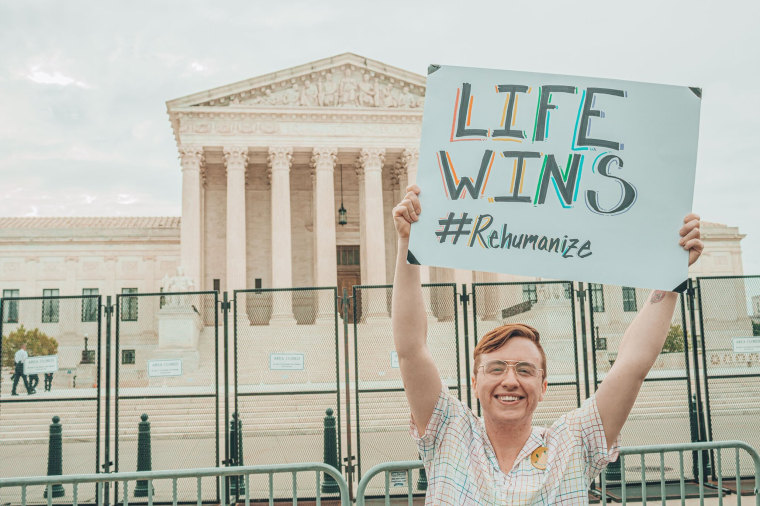Hayden Laye, 17, trekked from South Carolina to Illinois on Tuesday to campaign for Chris Butler, a Democrat running for Congress. Laye, who uses gender-neutral pronouns and isn’t old enough to vote, spent the day helping residents learn where Butler stands on a number of issues.
Butler opposes abortion rights. Laye does, too. Unlike most Democrats and LGBTQ people, Laye welcomed the Supreme Court’s decision Friday to dismantle a half-century of precedent by overturning Roe v. Wade.
Laye is among a small but vocal minority of lesbian, gay, bisexual, transgender and queer Americans who oppose abortion rights, seeing it as an extension of human rights advocacy. Many of them also appear to take Supreme Court Justice Clarence Thomas’ concurring opinion in last week’s ruling — which signaled a willingness to “reconsider” two landmark decisions legalizing same-sex marriage and intimacy — with a grain of salt.
“All human life is valuable, from the moment that human life begins until natural death,” Laye, who uses gender-neutral pronouns, said. “So I believe in free universal health care, protecting the environment, gun reform. Friday’s decision was just one step in this fight to protect life.”
Just how great the divide within the LGBTQ community is over abortion rights is difficult to gauge. But in recent days, some of the largest LGBTQ rights groups in the country — including the Human Rights Campaign, Lambda Legal and the National LGBTQ Task Force — blasted the reversal. Many Pride parades this weekend also resembled pro-choice rallies, as Planned Parenthood led New York City’s Pride march. LGBTQ voters are also significantly more likely to be registered as Democrats (50%) than Republicans (15%), according to a 2019 study from UCLA’s Williams Institute, and recent polling from the Pew Research Center found 80% of Democrats and Democrat-leaning independents believe abortion should be legal in all or most cases.
In the opinion of Laye, a self-described socialist, the abortion rights movement is “piggybacking” off the gay rights movement, which Laye said is “much more popular” (and the data agrees).
'A monumental expansion of human rights'
A number of LGBTQ people who oppose abortion say it’s a human rights issue. Volunteers involved with Rehumanize International — a progressive, LGBTQ-led anti-abortion organization based in Pittsburgh — are among them. Herb Geraghty, the group’s executive director and a board member of the Pro-Life Alliance of Gays and Lesbians, was “excited” to see what he called a “monumental expansion of human rights protections to a marginalized group.”
“Right now is clearly a moment for celebration, and for mourning the lives that have been lost in the last 50 years due to the Roe v. Wade decision,” Geraghty, 26, told NBC News.

Geraghty, who identifies as a member of the LGBTQ community, said Rehumanize International advocates for a “consistent life ethic,” which is defined on the organization’s website as the belief that “all human beings, by virtue of their humanity, deserve to live free from all aggressive violence, from the moment of conception to natural death.” Therefore, Geraghty said, the group opposes abortion, capital punishment, euthanasia and police brutality, among other forms of what he considers to be violence.
The Pro-Life Alliance of Gays and Lesbians, which has about 180 active members, called the decision “a momentous achievement for human rights.” The alliance has no political or religious affiliation and describes its mission as promoting the “pro-life ethic,” which it sees as consistent with the fight for LGBTQ rights. Cecilia Brown, the group’s president, told NBC News she considers the ruling a “human rights victory.”
“For a long time, a lot of people didn’t want to consider the unborn” part of human rights advocacy work, Brown, who lives in Florida, told NBC News.
A 'credible threat'?
Since Roe’s reversal in Friday’s Dobbs v. Jackson Women’s Health ruling, LGBTQ groups along the abortion divide have expressed differing views about how the decision will affect queer rights.
In a lone concurring opinion, Justice Clarence Thomas urged the high court to “reconsider” all of its substantive due process precedents, calling them “demonstrably erroneous.” He singled out three of these precedents, including Obergefell v. Hodges, the landmark 2015 case that legalized same-sex marriage, and Lawrence v. Texas, the 2003 decision which granted the right to same-sex intimacy. The remarks sparked fears among many in the LGBTQ community about the perceived precarity of those decisions, casting a shadow over the nation’s Pride celebrations over the weekend.
Several LGBTQ rights groups, including the Human Rights Campaign, the country’s largest, quickly expressed concern about the court’s willingness to reverse a half-century of precedent and singled out Thomas’ concurring opinion as particularly worrisome. HRC’s interim president, Joni Madison, said in a statement that the ruling proved “we are at an exceedingly dangerous, unprecedented moment” and that “all of our rights are on the line right now.”
Meanwhile, Charles Moran, president of the Washington, D.C.-based conservative gay group Log Cabin Republicans, said same-sex marriage remains “safe and settled.”
The national group, whose platform does not take an official position on abortion, issued a statement Friday pointing to a section of the court’s majority opinion, authored by conservative Justice Samuel Alito, who said the ruling should not be understood to cast doubt on “precedents that do not concern abortion.”
“LGBT conservatives remain level-headed and focused on the actual opinion,” Moran said. “If we see a credible threat to marriage equality, we will fight it — but this isn’t it.”
As for Geraghty, he said LGBTQ Americans have “good reason” to be concerned about their rights — though not due to Friday’s Dobbs ruling. He cited a surge in anti-transgender state bills and the “rightward shift” in the Supreme Court as causes for alarm, but added that they were actually heartened to see Alito’s majority opinion in the Dobbs ruling take a different stance than Thomas’ line of reasoning.
“Part of their consideration in the ruling was that things like same-sex marriage do not harm a third party,” he said. “That, to me, is clearly distinct from abortion, that harms someone because it takes a life.”
While there’s disagreement about what the Dobbs decision may mean down the line for recently gained rights like same-sex marriage, advocates note that the overturning of Roe v. Wade has a direct and immediate impact on LGBTQ Americans.
A 2019 study in the journal Women’s Health Issues found that all sexual minority groups, except lesbians, were generally more likely than their heterosexual peers to have a pregnancy, a teen pregnancy and an abortion. And a report published in 2021 in the journal BMJ Sexual & Reproductive Health showed that a “high proportion” of transgender, nonbinary and gender-expansive respondents had attempted abortion without clinical supervision.
Despite celebrating the “victory for the unborn,” Brown, who has led the Pro-Life Alliance of Gays and Lesbians for over two decades, said she has mixed feelings about the Dobbs decision because it does not address the myriad problems that can drive people to seek abortions, such as poverty and a lack of access to housing and affordable child care.
“It is a victory when you look at it from the point of view of the unborn child,” Brown said. “At the same time, we’ve done nothing to deal with the root causes, and if we don’t do something about the root causes, we’re going to be in a bad way as a country.”
